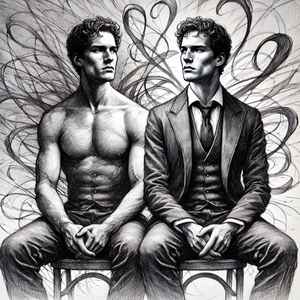T.S. Eliot’s The Love Song of J. Alfred Prufrock portrays J. Alfred Prufrock as the quintessential modern man – a figure caught in an endless conflict of indecision, self-consciousness, and a disordered psyche. Through fragmented imagery, introspection, and free verse, Eliot captures the disillusionment, anxieties, and alienation that defined the modern era. Prufrock’s struggles with identity, masculinity, and purpose mirror the broader spiritual and psychological crises of early 20th-century urban life.
Fragmented Psyche and Inner Duality
Prufrock’s mind wavers between two opposing selves – one longing for romantic assertion, the other paralyzed by fear and doubt. He begins the poem inviting an unknown listener, “Let us go then, you and I,” but this listener is ultimately revealed as his other self. This split mirrors the modern man’s internal fragmentation. On one side, Prufrock dreams of bold romantic declarations like Lazarus returning from the dead:
“I am Lazarus, come from the dead,
Come back to tell you all.”
On the other side, his pragmatic self foresees rejection and humiliation, lamenting:
“It is impossible to say just what I mean!”
The interplay of these two selves represents the internal tension between idealism and reality, action and inaction, that defines the modern individual.

Sensitivity and Alienation
Prufrock’s acute sensitivity to his surroundings intensifies his alienation. He is hyper-aware of societal judgments and his physical flaws, such as his thinning hair and bony limbs:
“They will say: ‘How his hair is growing thin!’
They will say: ‘But how his arms and legs are thin!’”
This obsession with others’ perceptions exemplifies his social anxiety and inability to connect meaningfully. Prufrock’s alienation is heightened by his intellectual depth. He criticizes society’s superficiality, represented by the women who “come and go, talking of Michelangelo.” These women’s conversations symbolize the empty cultural rituals of urban life, contrasting sharply with Prufrock’s deep yearning for authenticity.
Masculinity in Crisis
Prufrock’s constant comparisons to grand figures such as Michelangelo, Hamlet, and John the Baptist underscore his feelings of inadequacy. He sees himself as insignificant, declaring:
“I am not Prince Hamlet, nor was meant to be;
Am an attendant lord…
Deferential, glad to be of use.”
His self-deprecation reflects the crisis of masculinity in modern society. Prufrock is neither a heroic lover nor a decisive figure, but a timid, self-effacing man aware of his ordinariness. His insecurity about aging and physical decline also reinforces the tension between societal ideals of masculinity and his lived reality.
Escapism and Romantic Imagination
Unable to face the bleakness of urban life, Prufrock frequently retreats into escapist fantasies. He imagines himself as a crab scuttling along the ocean floor:
“I should have been a pair of ragged claws
Scuttling across the floors of silent seas.”
The image suggests his desire to escape human judgment and find solace in isolation. Similarly, he dreams of mermaids singing in an ethereal world, unattainable and disconnected from reality:
“I have heard the mermaids singing, each to each.
I do not think that they will sing to me.”
These moments of escapism highlight the modern man’s struggle to reconcile his inner world with an unrelenting external reality.
The Modern Man’s Dilemma
Prufrock epitomizes the modern man’s indecision and existential despair. His repeated refrain, “Do I dare?” conveys his paralysis in the face of action. The dullness of modern life are symbolized by his measuring out life “with coffee spoons,” a metaphor for the monotony and triviality of his existence. Prufrock lives in a cyclical “urban inferno,” unable to break free from the constraints of societal expectations and self-doubt.
Eliot emphasizes Prufrock’s crisis through the epigraph from Dante’s Inferno, where Guido da Montefeltro confesses his sins, secure that no one will escape hell to repeat his story. Similarly, Prufrock confides in the reader, knowing that his “overwhelming question” will never disrupt the world.

Style as a Reflection of Modernity
Eliot’s use of fragmented imagery, free verse, and disjointed time reflects the modern man’s fractured consciousness. Prufrock’s stream of consciousness moves unpredictably, mirroring his chaotic thoughts. The juxtaposition of grand literary allusions with trivialities like “toast” and “tea” summarizes the conflict between romantic ideals and mundane realities. Eliot’s innovative style aligns with modernist literature’s break from traditional forms, emphasizing complexity and chaos to mirror societal commotion.
Prufrock as the Quintessential Modern Man
Prufrock’s indecision, alienation, and escapism position him as a symbol of the modern man facing a fragmented world. His internal conflicts reflect the loss of grand narratives and ideals in a rapidly industrializing, war-torn society. While Prufrock lacks the heroic qualities of classical figures, his self-awareness and intellectual depth elevate him above the superficiality he despises. In his failures, he embodies the pathos of modern existence, making him both a tragic and profoundly human figure in Eliot’s exploration of modernity. Through Prufrock, Eliot captures the essence of a civilization caught between despair and survival, echoing the anxieties of the modern era.
What do you think?
Share your thoughts on how Prufrock reflects modern anxieties.
Additional Reading
6 Most Important Allusions in Prufrock
Allusions in Prufrock range from Biblical references to literary masterpieces. Here are six most important allusions in Prufrock that a...
Read MoreCharacter of J.Alfred Prufrock: Analysis of His Complexity and Anxieties
The character of Prufrock is the most remarkable aspect of T. S. Eliot’s poem “Love Song of J. Alfred Prufrock”...
Read MoreModernism in Prufrock
Modernism in Prufrock serves as a powerful lens through which T.S. Eliot’s The Love Song of J. Alfred Prufrock explores...
Read More




